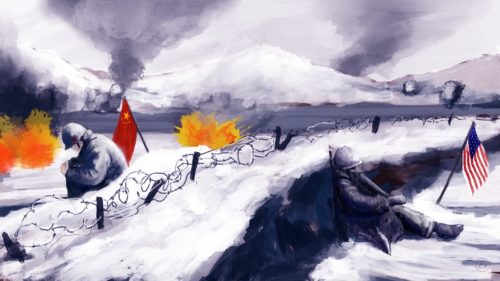70 years on, how China sees the Korean War
Public remarks in the coming days could say a lot about how China’s leadership currently views the “War to Resist U.S. Aggression and Defend Korea” — and how far it’s willing to go to provoke America.

On October 19, 70 years to the day from the night the first Chinese soldiers covered their insignia and quietly crossed the Yalu River into North Korea, Beijing’s Museum of the Chinese People’s Revolution will unveil an exhibition on the Korean War. The soldiers’ secretive entry into North Korea will likely figure prominently in Kuàguò Yālǜ Jiāng 跨过鸭绿江 (Crossing the Yalu River), a big-budget miniseries that began filming in August and will air on state broadcaster CCTV. On October 25, Chinese President Xí Jìnpíng 习近平 is expected to speak at a ceremony in Beijing for the 70th anniversary of Chinese troops’ first engagement in the Korean War, and bestow medals on veterans of that conflict. The war movie Jīngāng Chuān 金刚川, a collaboration by three blockbuster directors featuring action star Wú Jīng 吴京 (of Wolf Warrior 2 fame), will open in theaters across the country the same day.
Xi’s speech, the new exhibition, the movie, and the television production are just part of a flurry of 70th-anniversary remembrances across film, museums, and academia. While the Korean War is the “Forgotten War” in the United States, in China, the conflict continues to have resonance to this day — so much so that when the leader of Korean boy band BTS recently recognized American and South Korean war veterans, Chinese fans protested that China’s veterans of that war were left out.
But while the war is still remembered in China, its significance has shifted over the past seven decades.
A fight for Communism — and a new nation
The Korean War — which in China is referred to as the War to Resist U.S. Aggression and Aid Korea (抗美援朝战争 kàngměi yuáncháo zhànzhēng) — began on June 25, 1950, when North Korean forces invaded South Korea, prompting the United Nations to get involved. When UN forces, led by the United States, pushed up toward the Chinese border, Chairman Máo Zédōng 毛泽东 — with a nudge from Soviet leader Joseph Stalin — decided to commit Chinese troops.
The People’s Republic of China was less than a year old at that time. Two days after the fighting started, the American Navy’s Seventh Fleet was dispatched to prevent a confrontation between the PRC and Chiang Kai-shek’s Republic of China forces, who had fled to Taiwan the previous year.
Accounts from central players reveal that Mao and the PRC leadership saw the American military buildup in the region as an existential threat. “The tiger always eats people,” Commander Péng Déhuái 彭德怀 wrote in his memoir. In the 2013 documentary The Unforgettable Victory, General Yú Yǒngbō 于永波, former director of the General Political Department of the People’s Liberation Army, reiterated the notion, maintaining, “The enemy had come to our doorstep, and they forced us to enter the war.” Yet Mao was mindful to avoid a direct military challenge to the U.S., and the Chinese troops fought under the banner of the Chinese People’s Volunteer Army, to emphasize their role was to aid Korea.
Some three million volunteers participated in one way or another. The confrontation gave the People’s Liberation Army early lessons in logistics and tested Mao’s theories of guerrilla warfare, especially his famous instruction to wear away at the opponent bit by bit, “like eating sticky candy.” As the war dragged on, new troops rotated in both to relieve exhausted troops and to give more of them combat experience against the Americans, according to the memoir of Marshal Niè Róngzhēn 聂荣臻. To this day, Chinese academic journals feature scholarship on everything from misjudgments of American intelligence to psychological propaganda during the truce negotiations.
“The Korean War, as I understand it, is very much like the First World War to Europeans. It changed the ways in which they understand modern warfare,” says Zhao Ma, an associate professor of modern Chinese history and culture at Washington University in St. Louis. For the Chinese forces, it was their first experience with a conflict involving a navy, air force, artillery, and logistics all at the same time. They also faced aerial bombardment in which “you don’t see your enemy, you just hear them,” Ma adds.
There are three events seen as the founding myth for the early PRC: land reform, the suppression of counter-revolutionaries, and the Korean War.
Chinese rhetoric at the time of the war focused on the struggle for international socialism: Americans were “imperialists,” South Koreans their “running dogs.” The propaganda value was evident from day one — documentary film teams were embedded with troops and captured efforts on the Chinese home front. The two-part documentary Resist America and Aid Korea screened in mainland cinemas starting in 1951.
In the eyes of Chinese propagandists, the course of the conflict showed Chinese strength against a technologically superior U.S. military. American General Douglas MacArthur famously assured President Harry Truman that troops would be “home by Christmas,” but the war dragged on at essentially a stalemate until an armistice was signed in 1953.
In the late 1980s and 1990s, generals began publishing their remembrances of the war, as the changing political climate made the military men more comfortable talking about their experiences. Many of those accounts were excerpted and translated into English in the 2001 collection Mao’s Generals Remember Korea.
Today’s buildup in the South China Sea is a direct descendant of the concept of “active defense” that came out of the war — the notion that China needs to repel attackers outside of its borders to avoid an attack on its shores, says Xiaobing Li, an editor and translator of Mao’s Generals Remember Korea and a history professor at the University of Central Oklahoma. If there is a conflict between China and the United States, China wants the battleground to be a thousand miles away in the South China Sea, Li says, not on its own soil.
Ma, who has written extensively on the cultural memory of the Korean War in China, says that there are three events seen as the founding myth for the early PRC: land reform, the suppression of counter-revolutionaries, and the Korean War. As China moved away from a socialist economy and the divisiveness of the early days, only the Korean War has survived as a means to unify the country and solidify early Communist rule.
Rethinking old enemies and allies
The year 1992 marked a clear turning point, when China and South Korea normalized diplomatic relations. The Cold War was over, while Dèng Xiǎopíng 邓小平 had reaffirmed his commitment to reform with his southern tour. Depictions of the Korean War as an ideological fight for an international movement waned, says Ma. Old enemies and allies no longer applied; the war was recast as a moment of sacrifice and self-defense for the new nation. Pop culture largely fell silent on the war as China joined the World Trade Organization in 2001 and actively engaged the United States and the rest of the capitalist world. A 2000 TV series — pegged to the 50th anniversary of the conflict — was scrapped after $4.5 million had been spent to film it.
In the meantime, China was losing patience with North Korea over nuclear provocations and stalled six-party talks, and its old socialist ally was increasingly looking like a Cold War curiosity as China’s economy boomed. The 2016 TV drama The 38th Parallel depicted a Chinese soldier showing compassion for a South Korean father and daughter, and omits North Korean soldiers altogether.
“Around 2010, a new generation of voices came into play,” says Ma. Specifically, soldiers began speaking of their personal experiences and the trauma of war. “It’s more about a sacrifice, and this sacrifice can be defined in nationalist terms because these are the soldiers who loved their country.”
There’s growing recognition that the Korean War left China isolated for nearly three decades and prevented the PRC from retaking Taiwan. Both concerns raise uncomfortable questions for the current government.
Today, with relations between the U.S. and China in free-fall and tensions rising around Taiwan, the new crop of productions and war commemorations may be a way to harness nationalism and a sense of national sacrifice. Last year, state broadcaster CCTV began airing old Korean War documentaries and dramas to “echo the current era,” according to Global Times. Taiwan news outlet China Times reports that over the summer, the National Radio and Television Administration sent out guidelines to television stations to air more old productions that depict America as the enemy.
However, Chinese leaders are careful to calibrate their rhetoric and keep nationalist sentiment from running too hot.
The history of the Memorial Hall of the War to Resist U.S. Aggression and Aid Korea is instructive. The memorial reopened last month in the northeastern city of Dandong, just across the Yalu River from North Korea. As China’s only museum dedicated to the conflict, the official history it recounts has changed since it opened in 1958. A 1993 relocation and renovation removed references to Americans (the opponents were described as UN forces), and anti-South Korean rhetoric disappeared.
The museum’s newest incarnation — six years in the making — does include references to American troops as an invasive force. “We begin to see this…polarizing black-and-white picture coming back to the new narrative,” says Ma. But no senior leaders came for the reopening — in contrast to 1993, when Hú Jǐntāo 胡锦涛, then next in line for China’s presidency, attended that year’s reopening ceremony.
Such displays may have limited impact on public opinion, anyway. As much as the Chinese government tries to control information within its borders, today there is a plurality of voices within China and an array of entertainment options — a far cry from the 1950s, when 10 million people saw Resist America and Defend Korea within two months.
In a chapter from the forthcoming book National Memory in a Time of Populism, Ma writes about My War, a 2016 Korean War movie from state-owned China Film Group Corporation, which was a complete flop. Online commentators savaged the film, which they saw as outdated and felt glossed over the war’s cruelty. There’s also growing recognition that the war left China isolated for nearly three decades and prevented the PRC from retaking Taiwan. Both concerns raise “all kinds of questions I don’t believe the government is able to fully answer at this moment,” Ma says.
Ma says that the Chinese government is attempting to telegraph restraint and red lines to the outside world, even as it revives memories of an American invasion in northeast Asia, a conflict brought to China. “I think you will see this memory of the century of humiliation still is playing a role there, to show that China is always a victim of somebody’s invasion — and could still potentially become the victim of an invasion again,” he says.
In China’s eyes, “the war bought China a long peace, especially with the U.S.,” adds Li, the translator of Mao’s Generals Remember Korea. But there were costs: close to 200,000 Chinese lives according to one count, and a still-divided Korean peninsula. And it is unclear whether anyone outside of China’s borders understands what it is trying to say or draws the same lessons from the Korean War.
Statements and official events in the coming days and the tenor of the upcoming films and TV series could offer clues about whether Chinese leadership is willing to risk upsetting that long peace.



